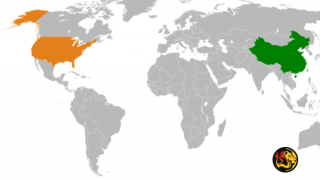
by Emmitt Barry, Worthy News Correspondent
(Worthy News) – In a major reorganization announced by the U.S. Air Force and its newly established subsidiary, Space Force, the U.S. Air Force Combat wings will be transformed into “units of action” designed to fight better if a war breaks out with China, the Washington Times reported.
The announced overhaul plan aims to enhance military readiness and the ability to project force for air and space forces. It addresses the challenge of a more assertive China in East Asia by incorporating the development of new weapons and sophisticated technological capabilities for warfare.
“The People’s Republic of China’s (PRC’s) military advancements threaten our intended mode of warfare and utilize assertive strategies to impose costs and deny U.S. power-projection capabilities,” stated the Air Force in a report released on Monday.
Operational air wings will be reorganized into three types of units: “deployable combat wings,” “in-place combat wings,” and “combat generation wings.”
In addition, the Air Force will establish an independent command focused on conducting cyber warfare and protecting against expected cyber attacks.
“We cannot afford to be complacent, holding on to outdated structures,” Gen. David W. Allvin stated when unveiling the overhaul. “The Air Force built for the previous era is no longer optimized for the current strategic landscape.”
Under the reforms, aging U.S. nuclear forces, which include two-thirds of the Air Force’s land-based missiles and nuclear bombers, will receive improvements. Concurrently, the Nuclear Weapons Center responsible for the strategic command and control of Minuteman III missiles and nuclear B-52 bombers is undergoing overhaul and expansion.
The Air Force has not disclosed specific information about the new weapons and capabilities it plans to pursue with the reforms. Currently, around 450 F-35 jets are operational, with intentions to purchase 2,500 F-35s at an estimated cost of $1.7 trillion.
“It has been clear to me for over a decade that China is intent on fielding a force that can conduct aggression in the Western Pacific and prevail even if the United States intervenes,” Air Force Secretary Frank Kendall stated in September.
“While China has focused on creating the regional conventional forces it believes it needs, China is also dramatically expanding its nuclear force and military space capabilities. We cannot sustain deterrence by standing still,” Kendall concluded.
China is believed to possess sophisticated space warfare technologies, including ground-launched missiles designed to take down satellites, electronic jamming devices, laser weaponry, and mobile robotic satellites capable of seizing and dismantling other satellites.
Copyright 1999-2026 Worthy News. This article was originally published on Worthy News and was reproduced with permission.
Latest News from Worthy News
The Trump administration has finalized a sweeping reciprocal trade agreement with Taiwan, confirming a 15 percent U.S. tariff rate on Taiwanese imports while securing broad new market access and purchase commitments for American goods.
Democrats are applauding White House border czar Tom Homan’s Thursday announcement that immigration enforcement operation in Minnesota will end next week.
Democrats in the U.S. Senate tanked the Homeland Security full-year funding bill in a last-ditch vote Thursday, all but guaranteeing a partial government shutdown starting Saturday.
Mourners in a remote Canadian town grappled Thursday with the aftermath of one of the country’s deadliest school shootings in decades, as families, survivors and leaders reacted to the tragedy that left eight victims — most of them children — dead, along with the 18-year-old suspect.
A gunman who opened fire at a school in southern Thailand’s Hat Yai city on Wednesday wounded a teacher and a student before being detained, authorities said, in a rare attack that sent students and staff into panic.
The Republican-led House of Representatives has passed the Safeguard American Voter Eligibility (SAVE) America Act, advancing legislation that would require proof of citizenship to register to vote and photo identification at the polls. The bill now heads to the Senate, where its future remains uncertain amid strong Democratic opposition.
Israel’s Ministry of Defense announced on Wednesday that its advanced David’s Sling air and missile defense system has completed a series of complex modernized tests, a development officials say bolsters the country’s defensive posture as tensions with Iran escalate and the United States prepares military options that could include direct strikes.







